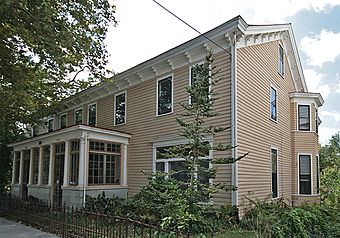Kellogg House (Cincinnati, Ohio) facts for kids
Quick facts for kids |
|
|
Kellogg House
|
|

Front and western side of the house
|
|
| Location | 3807 Eastern Ave., Cincinnati, Ohio |
|---|---|
| Area | Less than 1 acre (0.40 ha) |
| Built | 1835 |
| Architect | Samuel Knicely |
| Architectural style | Federal |
| MPS | Columbia-Tusculum MRA |
| NRHP reference No. | 79002702 |
| Added to NRHP | August 24, 1979 |
The Kellogg House is a historic building in the Columbia-Tusculum neighborhood of Cincinnati, Ohio. It was built in 1835. This house is important because of its unique design. It mixes the Federal style with local building ideas. Experts say it's a great example of how building styles changed over time.
Contents
The Historic Kellogg House
The Kellogg House stands out in Cincinnati. It is a two-and-a-half-story building. You can see two tall chimneys on each end. The outside walls are made of wood planks. These planks sit on a strong stone base. A metal roof covers the house. It rises to a high point on each side.
What Does It Look Like?
The house has some special features. Small supports called brackets hold up the roof's edge. There are two parts added to the back of the house. Also, two covered porches are on the front. Inside, the main hallway is very fancy. It has detailed designs and pillars. The house even has its original pipe organ in the hallway.
A Look Back in Time
The Kellogg House started as a hotel. Samuel Knicely built it in 1835. Seven years later, in 1842, he gave it as a wedding gift to a Mr. Kellogg. The house stayed in the Kellogg family for a very long time. They owned it until 1977. By the late 1970s, the house had been changed into apartments.
From Hotel to Home
After 1977, Richard Pardini and his wife Doris bought the house. They have owned it since then. The building has seen many changes over the years. It went from being a hotel to a family home. Then it became apartments.
A Special Historic Listing
In 1979, the Kellogg House got a special honor. It was added to the National Register of Historic Places. This list includes buildings and places that are important to history. The house was recognized for its amazing architecture. It was one of many historic places in Columbia-Tusculum added at that time. Other buildings and even two cemeteries were also listed.



